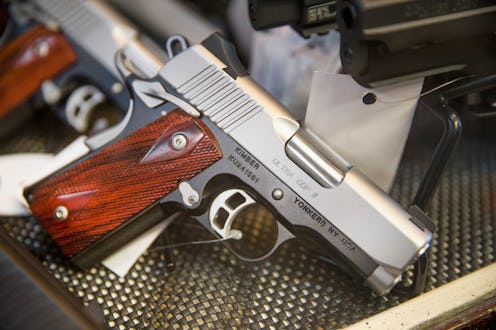News
Here's What The Gun Laws In Florida Are Actually Like

A school shooting happened at Marjory Stoneman Douglas High School in Parkland, Florida on Wednesday, leaving several injured and at least one person dead. Authorities have a suspect in custody, although it's too early to speculate about any motivation for the shooting or about exactly what happened during the active shooter situation. But the incident will likely draw attention to what Florida's gun laws are like, judging by how people have reacted to harrowing mass shootings in the past.
This article contains information about gun violence, which some may find triggering.
According to local reports, the Parkland high school shooter opened fire at approximately 2:40 p.m. local time, right around the time classes were dismissed for the day. It's unclear how many casualties there were at this point. It's also unclear what weapon was used in the shooting.
Therefore, there's no way to tell whether state or federal gun laws had any bearing on the shooting just yet. Local authorities simply haven't released enough details or information yet to paint a picture of what happened in Parkland. Regardless, mass shootings like these often leave people searching for answers, and many people will want to familiarize themselves with the gun laws in Florida.
As far as gun restrictions and regulations go, Florida has some of the loosest, most lenient laws in the country. In some areas, there are laws specifically designed to protect gun owners or would-be purchasers from rules, restrictions, or record-keeping, ostensibly to avoid infringing on their Second Amendment rights.
In others, there are simply no statutes on the books, leaving the state without even the most basic forms of regulation on gun sales, purchases, or ownership. Here's the basic state of gun laws in Florida.
- Firearm owners and purchasers are not required to acquire a licence.
- It's illegal for any government entity to compile a list or registry of legal gun owners.
- There are no laws restricting extended capacity magazines, which allow shooters to fire off dozens more round per reload.
- No background check is required for gun sales between private owners.
- So-called "assault weapons" are not banned, although a bill proposing such a ban was introduced to the state senate last year. Polling in late October suggested that a narrow majority of Floridians opposed the ban.
As the Giffords Law Center notes ― so named for former Arizona representative Gabby Giffords, who was shot by a gunman back in 2011 ― the state does require a three-day waiting period to purchase a gun, although Floridians who possess a permit to carry a concealed gun are not subject to the waiting period.
It's also the case that Florida place legal liability on adult gun owners who fail to safely secure their firearms around children who're 16 or younger. This only becomes a matter of criminal liability, however, when a minor gains access to it, then wields it aggressively, carelessly, or in public.
Again, it's far too early to tell whether any changes to the state of Florida's gun laws would have prevented what took place in Parkland on Wednesday, or whether they could have to any extent reduced the deadly impact of the shooting. While the suspected shooter is reportedly in custody, there still have not been any details about their reported motivations, moment-to-moment actions, or how they came into possession of their weapon.
In the early weeks of 2018, there have already been more than a dozen school shootings nationwide. In fact, the incident at Marjory Stoneman Douglas High School is reportedly the 18th school shooting in the last 45 days, and the first in the state of Florida this year.